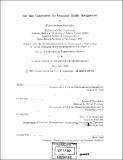On-line calibration for dynamic traffic assignment
Author(s)
Antoniou, Constantinos
DownloadFull printable version (12.78Mb)
Other Contributors
Massachusetts Institute of Technology. Dept. of Civil and Environmental Engineering.
Advisor
Moshe E. Ben-Akiva and Haris N. Koutsopoulos.
Terms of use
Metadata
Show full item recordAbstract
(cont.) application, the EKF has more desirable properties than the UKF. Furthermore, the Limiting EKF provides accuracy comparable to that of the best algorithm (EKF), but with computational complexity which is order(s) of magnitude lower than the other algorithms. In this thesis, an on-line calibration approach for dynamic traffic assignment (DTA) that jointly estimates demand and supply parameters has been developed. The objective of on-line calibration is to introduce a systematic procedure that will use the available data to steer the model parameters to values closer to the realized ones. The approach is general and flexible and imposes no restrictions on the models, the parameters or the data that it can handle. The on-line calibration approach is formulated as a state-space model, comprising transition and measurement equations. A priori values provide direct measurements of the unknown parameters (such as origin-destination flows, segment capacities and traffic dynamics models' parameters), while surveillance information (for example, link counts, speeds and densities) is incorporated through indirect measurement equations. The state vector is defined in terms of deviations of the parameters and inputs that need to be calibrated from available estimates. Standard Kalman Filter theory does not apply to this formulation, as it is not linear. Therefore, three modified Kalman Filter methodologies are presented: Extended Kalman Filter (EKF), Limiting EKF, and Unscented Kalman Filter (UKF). A case study on a freeway network in Southampton, U.K., is used to demonstrate the feasibility of the approach, to verify the importance of on-line calibration, and to test the candidate algorithms. The empirical results from this application support the hypothesis that simultaneous on-line calibration of demand and supply parameters can improve the traffic estimation and prediction accuracy and show significant benefits (over the base case in which only the origin-destination flows are estimated on-line). In this
Description
Thesis (Ph. D.)--Massachusetts Institute of Technology, Dept. of Civil and Environmental Engineering, 2004. Includes bibliographical references (p. 149-153).
Date issued
2004Department
Massachusetts Institute of Technology. Department of Civil and Environmental EngineeringPublisher
Massachusetts Institute of Technology
Keywords
Civil and Environmental Engineering.